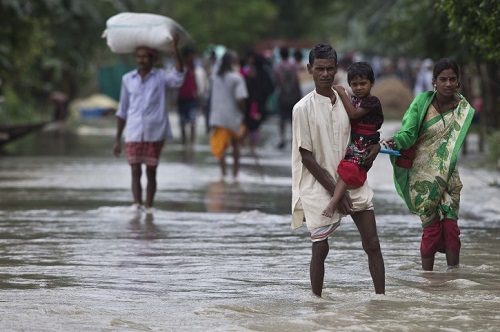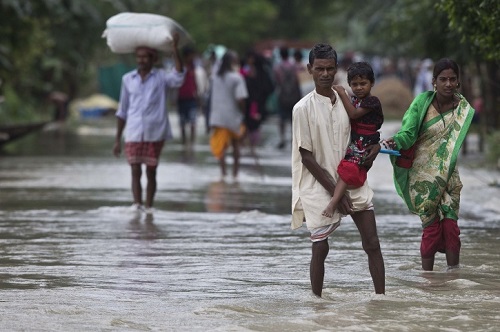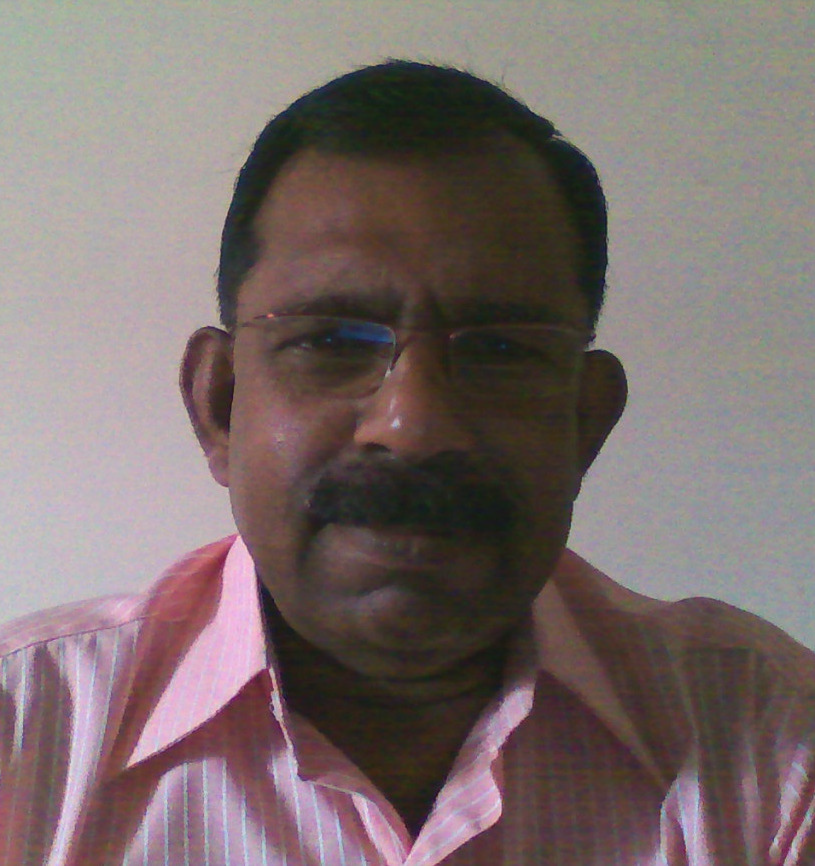Reuters photo
By
Jose Kalathil
The devastating flash floods in India’s North-eastern state of Assam that began in July, have claimed over 120 lives so far. It has also made the lives of 3.34 crore (33.4 million) people miserable in the 29 out of the 33 districts of the state. Over 139,000 displaced people have taken shelter in 629 relief camps, according to the Assam State Disaster Management Authority (ASDMA). The situation is likely to worsen further with the meteorological department forecasting very heavy rainfall in the neighbouring states.
In the last 50 years, Assam has already lost 7% of its land to soil erosion in the state’s 17 districts. Over Rs 30,000 crore has been spent on making embankments, but most of it turns out to be either insufficient or at times even counterproductive.
Seeing the severity of the situation, leaders of several faiths under the umbrella of the Inter Faith Group joined hands to help the government in mitigating the sufferings of the affected. They offered expertise available with them in training the people who are working with the flood-hit.
The team, led by Professor N Vinod Chandra Menon, founder member of the National Disaster Management Authority (NDMA), included Father Frederick D’ Souza, executive director of Caritas India, Swamini Adityananda Saraswati of Parmarth Niketan Ashram, Rishikesh, Brother Arun Kumar of Brahma Kumaris, Mount Abu, and Sibghatullah Ahmed of Islamic Relief India.
Rajesh Prasad, Revenue Secretary and CEO of the Assam State Disaster Authority, urged the team to visit a village in the most-affected districts of Lakhimpur or Majuli and create awareness among the people about the after-effects of floods like water-borne diseases, human trafficking, etc. Assuring the government’s full support to their initiative, the CEO said their efforts can be replicated in other districts and also in other states like Gujarat, Bihar and Orissa, if successful.
He said due to communication problems, even central relief cannot be distributed in the worst-affected areas. As roads are damaged and electrical posts are fallen, contacting relief workers too becomes difficult. Mr Menon suggested installing solar panels in these areas so that the affected can recharge their mobile phones to contact the authorities. The team also called on Chief Secretary Vinod Kumar Pipersenia.
The delegation also distributed Water, Sanitation and Hygiene (WaSH) kits donated by Caritas India, the relief arm of the Catholic Bishops Conference of India, to 1,600 families in the worst-affected villages of Moregaon district. The kit consisted of two buckets, two plastic mugs, one Savlon antiseptic, five bathing soaps, four washing soaps, one soap case, five NcDCC tablet strips, four-meter cotton coloured clothes, two packets of toothpastes, five toothbrushes and one-meter cloth. Gaurab Talukdar, a volunteer, said the locals would gladly accept what they are offered free without bothering who is giving it. What they need is immediate help.
In Afukundu village, where 80 Boro families are engaged in piggery, farming, fishing, etc, for a living, there were complaints of not getting any government help. None of them have Aadhar cards to get the benefits. No one owns gas stoves either. In another village, where 71 families live, each having three to four children, make rafts with bamboo and banana stems for transport. Since they defecate on river banks, they are more prone to communicable diseases like dysentery, fever, etc.
Village mukhya, Badan Kay Bar, said the locals are deprived of their livelihood as they cannot fish in swollen water. They have to cross the Brahmaputra river to fetch drinking water. They also move to upper areas, about 90 kms away. They are not keen on shifting to other places permanently even if the government offered them shelters. Bar also complained of getting any old age pension or benefits to pregnant women and breast-feeding mothers.
According to A K Goldsmith, chairman of the state Inter Agency Group (IAG) that facilitates collaboration and coordination among the many actors and agencies working with communities before, during and after emergencies, 56% of the affected have food availability for less than a week and 34% have food for one to three weeks. This shows that only 9 percent of the people will have sufficient food for a period of one month. The relief camps set up by the district administration are not enough to meet the needs of the affected, he said. He stressed the need for installing temporary or transitional toilets to prevent communicable diseases. “Menstrual hygiene management (MHM) should not be limited to distribution of sanitary pads, but also address the socio-cultural practices around it,” he added. Health services are also not adequately met post-disaster as compared to pre-disaster, he opined. This is due to non-accessibility and damage to buildings due to erosion of land.
Most vulnerable people to these diseases are children, pregnant women, lactating mothers, elderly and differently-able. The situation also leads to human trafficking. IAG also suggested that the practice of Mishing tribals who live traditionally in houses built in stilts, is to be followed. They can easily dismantle the ‘Chang” house and raise it further, when needed.
About Caritas’ involvement, Fr D’ Souza said his organisation wanted to reach the unreachable without any caste or religion. Swamini said the initiative would expand the space of inter-faith. Bro Arun said as children of Brahma (God), we all have a duty to help the affected. Sibghatullah said the effort would strengthen his organisation’s work in these areas.
Jose Kalathil
Jose Kalathil is a senior journalist based in New Delhi. With more than three decades of experience in different publications in India and Nepal, he is comfortable writing on any topic under the sun.



